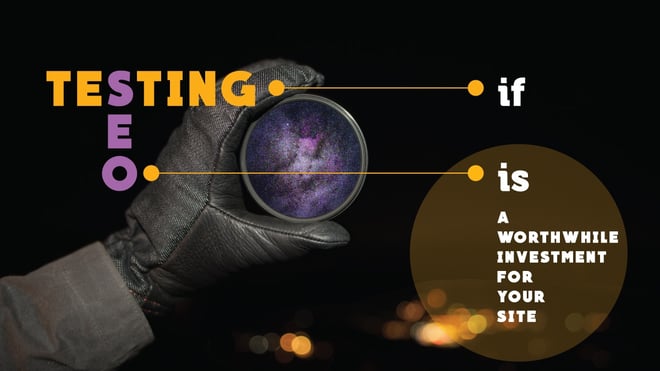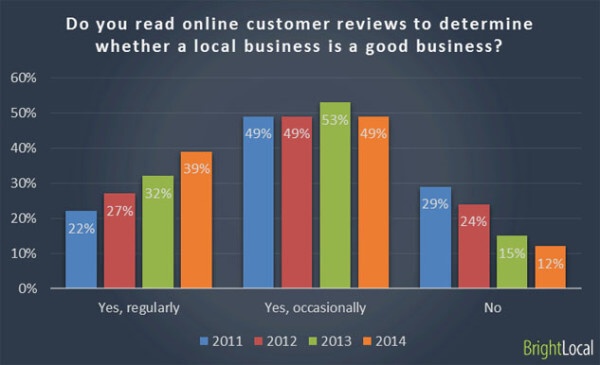Editor's Note: Today we have a post from guest author Pankaj Mondal. Pankaj is a freelance writer who specializes in SEO, SaaS, and online marketing.
Without further ado, take it away Pankaj!
Have you ever wondered how many blog posts are published every single day?
Well, it’s over 2 million, according to Marketingprofs.
That means about 46 people have published a new post by the time you’ve finished reading these sentences. It's tough to stand out among all that content, but there is no choice if you want to make your business successful.
In a world where more than 90% of online experiences begin with a search engine, showing up on the front page of Google can be the difference between a business flourishing and bankruptcy.

Now, what does SEO mean?
You know very well that it stands for search engine optimization, but what exactly gets optimized?
Is it the writing? Or the links? Or design?
Yes, it’s all of them and much more.
Why Invest in SEO?
Before we cover the various ways to test if SEO is a worthwhile investment for your site, let's look at why SEO is important.
Here’s why your business might need to invest in SEO:
- SEO works.
- Sustainable ROI.
- Search isn't going away.
- Search engines drive traffic.
- Rise of mobile.
- Your competition.
SEO Works
Only Google knows exactly how their search algorithm works.
However, we do know the top two ranking factors are content and links. With this information SEOs have been able to establish best practices that can impact search performance.
For example, Joshua Guerra of Bizcor, points to user experience:
"As long as you focus on optimal user experience while conducting methodic SEO techniques, you’ll be rewarded with improved positioning along with organic traffic."
- Joshua Guerra
Following these best practices leads to real results. There are many case studies demonstrating the results SEO can achieve:
- How does SEO actually work? by John Doherty
- SEO Case Study - 313% More Organic Traffic with REAL Examples by Nick Eubanks
- [Case Study] How We Ranked #1 for a High-Volume Keyword in Under 3 Months by Dmitry Dragilev
These case studies demonstrate the power of effective SEO.
Sustainable ROI
Compared to the expenses associated with other forms of online marketing SEO provides great ROI.
While social media may be crucial to your brand image and PPC may drive greater revenue, in many cases, SEO remains a bedrock of your online presence.
Paid promotion ends the second you stop paying, but organic traffic is ongoing and grows exponentially with SEO investment.
Search Isn't Going Away
The way search engines are developing, it’s highly unlikely that SEO will stop being effective in the foreseeable future.
The search results are constantly evolving, and voice search is quickly gaining popularity. But there are still ways to optimize for these results and doing so will continue to earn visibility and customers.
Search Engines Drive Traffic
Around 88% of customers read online reviews to determine the quality of a local business before making a purchase, and this should increase in the coming few years.

(Source)
As a business owner, your key responsibility should be to make yourself easy to find. It won’t be long before everyone turns to the internet to find products and services, and you want to be there when they do.
Without proper SEO users will overlook your company, and find your competitors instead.
Rise of Mobile
The amount of traffic delivered to mobile devices is rapidly increasing, with mobile accounting for 50.3% of the world’s e-commerce traffic.
With this massive explosion in mobile usage, a totally new world of effective SEO methodologies has opened up for firms. Mobile search especially puts an increased emphasis on local SEO.
Your Competition
Just because you're not investing in SEO, doesn't mean your competition isn't.
As Jason Bayless, CEO of BestSeoCompanies.com points out, SEO is a never-ending process.
"If you are not doing anything to improve your position, you’ll be losing ground to your competitors. So, be on your toes and never allow your competitors to out maneuver you by disregarding this tool."
- Jason Bayless
If you want to beat your competitors online, you need to account for organic search.
Testing SEO for Your Organization
How do you test the merits of SEO for your organization?
Making small investments into SEO to demonstrate proof of concept is tempting as it has low risks and cost. Also, for firms that are heavily engaged in paid advertising, it’s fairly common to allocate a tiny budget for running cheap tests.
However, there are a few reasons short-term testing isn't ideal:
- SEO requires teams within the organization and sometimes outside entities to collaborate in order to execute SEO projects.
- SEO results are not instantaneous but cumulative; the results can often only be seen with the passage of time.
- If you’re a novice in the field of SEO, it's difficult to find institutional knowledge on “how to do SEO”, and there aren’t any workflows or processes around it.
Because of tests that are poorly implemented, many businesses trying this approach never get SEO off the ground. As a result, they abandon SEO, claiming that it did not show results.
Here are some handy tips for you to test if SEO works for your business/organization.
- Kick off your project with a clear goal in mind.
- Use sustained testing.
- Hire someone to manage your SEO project.
- Create a detailed project plan.
Let's examine each individually.
1. Kick Off Your Project with a Clear Goal
Having a defined objective is essential when you launch an SEO project. You need to have a clear idea of what defines success before you start SEO work.
It's important to benchmark where you're starting from, with all relevant data.
If you want to start SEO for a new site, create a test plan based on metrics that align with your stated goals and engagement strategies. Some potential metrics could include:
- Overall traffic.
- Organic traffic.
- Time on site.
- Keyword growth.
- Etc.
By implementing this model, you can better track and report the fruits of your efforts. It will also enable you to identify missed opportunities if you apply your standard KPIs from the beginning.
In the beginning, the amount of movement will be pretty low, particularly if you’re in a competitive niche or if your website is new. It's important to fast-track SEO projects and ensure they are done quickly so they don't bog down your project. It's easier to track SEO results if you make changes quickly.
Once you complete some of the initial projects, you should see results in your tracked metrics.
2. Use Sustained Testing
A great advantage of paid promotion is that you can run short tests on ads, campaigns, and landing pages. However, testing organic search takes time.

The length of time it takes to run an effective test depends on how quickly you want to get SEO projects done, how competitive your niche is, and your specific goals.
Generally, if you’re in a less competitive niche (e.g. prosthetics for pets) you won’t have an uphill battle and can see significant results in just a few months. On the other hand, if you’re in an ultra-competitive niche (e.g. automotive or insurance) you’ll have to run your test for a longer period of time based on what a successful outcome means to you.
3. Hire Someone to Manage Your SEO Project
If you’re dead serious about testing SEO for your organization/business, it’s important to have an in-house SEO specialist who can manage each day’s workflow, especially if you’re working with an agency or vendor.
You need to have someone coordinating within your organization between the team responsible for content creation, the website front-end, and the decision makers.
4. Create a Detailed Project Plan
Having a detailed plan to complete the test beforehand helps the project progress seamlessly.
A plan presents ample opportunities for important stakeholders to provide their input on the test and sign off, saving you a ton of time. In addition, it gives you an opportunity to identify technological challenges, and uncover important requirements that are not highlighted in the initial project scope or those that have been missed.
By following the above tests, you can understand how SEO could benefit your business.
Have you tried other ways of testing SEO? Let us know in the comments section below.

